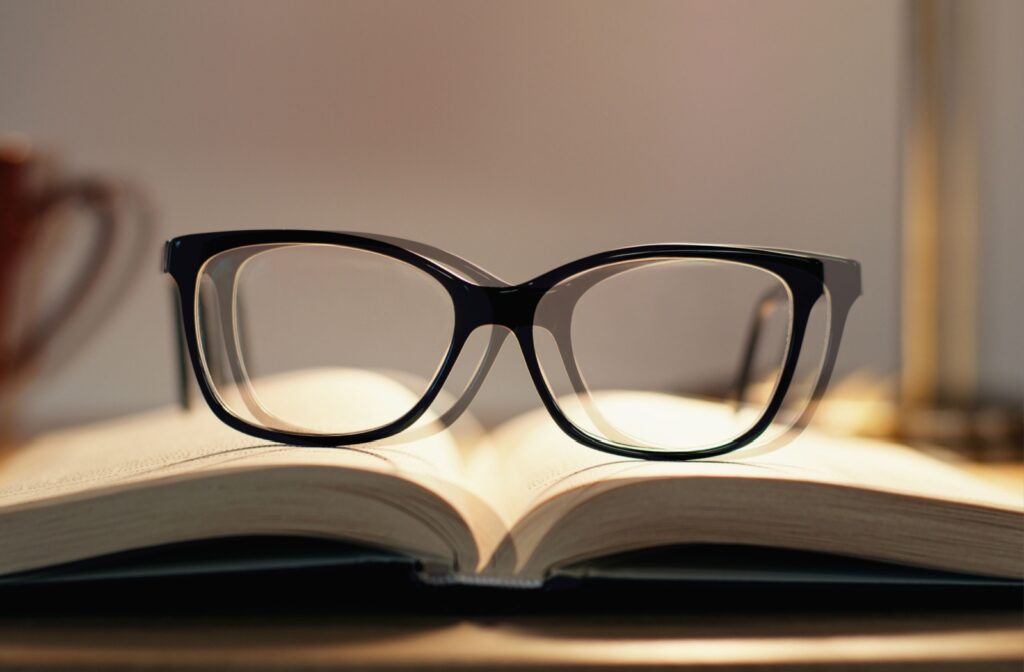Concussions are serious injuries that can disrupt the normal functioning of the brain. They occur when a blow to the head or body causes the brain to rapidly move back and forth, striking the inside of the skull. This movement can affect brain function and lead to a variety of symptoms. Some ways that a concussion can affect your vision include:
- Double vision
- Blurred vision
- Trouble focusing
- Glaring or light sensitivity
- Poor tracking ability
Concussions are common in sports such as hockey and soccer, where players may collide with each other, the ball, or the ground. Young athletes are particularly at risk when it comes to such issues due to their developing brains and active participation in sports.
The importance of early intervention cannot be overstated. Following a concussion, a person of any age should book an appointment with their eye doctor for an eye exam. Even without obvious symptoms, an optometrist can rule out potential problems. If there are concussion-related issues, your eye doctor can offer tailored treatment advice, like vision therapy, for example.
Concussions & Their Impact on Vision
Concussions don’t just affect your brain—they can change how you see the world. The link between concussions and vision is strong, as the brain processes visual information.
A concussion can lead to changes in visual acuity, affecting how clearly you see objects. Eye tracking, or the ability to follow a moving object smoothly, can also be impaired, making it difficult to read or engage in activities requiring focus.
Understanding these potential impacts on vision is essential for anyone who has sustained a concussion or is involved in sports where concussions are a risk. Comprehensive care and monitoring after a concussion are important for ensuring that all symptoms, including vision issues, are addressed.

The Healing Role of Eyeglasses
Eyeglasses can be a valuable tool in the recovery process after a concussion, especially for those experiencing vision-related symptoms.
Special lenses designed to filter light can reduce sensitivity or only allow certain light wavelengths to enter the eye. These lenses often have a subtle tint that helps mitigate glare and discomfort.
Neurolens is another innovative option for individuals recovering from concussions. These lenses are specifically designed to address eye misalignment and relieve associated visual discomfort. By improving eye alignment, Neurolens helps reduce strain on the visual system, making it a powerful tool for managing post-concussion symptoms.
Frames designed to fit comfortably and securely can also help with recovery. Such frames ensure that corrective lenses are used effectively, providing clear and stable vision without adding pressure or discomfort to the head, which is important for those recovering from a concussion.
Additionally, prism lenses can help address issues like double vision and eye misalignment. These lenses adjust how light enters the eye, allowing the brain to process visual information more effectively, which can aid healing. If your eye doctor offers vision therapy services, they may explore this treatment avenue with you.
Vision & Sports Performance Post-Concussion
Clear vision is a critical component of sports performance, especially in fast-paced games like soccer. Vision problems resulting from a concussion can significantly affect a young athlete’s ability to play safely and effectively. Impaired vision can lead to slower reaction times, decreased coordination, and difficulty judging distances.
This makes getting a comprehensive eye exam after a head injury crucial. Such exams can identify specific vision problems and ensure that appropriate corrective measures, like eyeglasses with special lenses, are implemented. Addressing these issues can help athletes return to sports with confidence and safety.
By prioritizing eye health and addressing vision issues post-concussion, our young athletes can continue to enjoy the benefits of sports participation without compromise.
Supporting Young Athletes
Preventing concussions begins with educating players, coaches, and parents about the risks and signs of head injuries. Encouraging good sportsmanship and proper playing techniques can also reduce the likelihood of collisions that could lead to a concussion.
When a concussion is suspected, early recognition and prompt action are critical. Ensuring that players get the necessary medical evaluation and rest is essential for a full recovery. Open communication between coaches, parents, and players about symptoms and progress can help manage expectations and recovery timelines.
Incorporating regular vision screenings and comprehensive eye exams into the routine care of young athletes can help identify any issues early. These screenings should be an integral part of health checks, ensuring that any vision problems are addressed promptly and appropriately.
Prioritizing Eye Health & Safety
Eye health is an important aspect of overall well-being, particularly for those involved in sports—because sports themselves are also important! That’s why we also sponsor the Aurora Football Club’s U10 team. Just like healthy vision, fun and fitness are building blocks of a good quality of life.
Recognizing the potential impact of concussions on vision underscores the need for proactive measures. Eyeglasses and other corrective measures can play a crucial role in the recovery and performance enhancement process.If you have any concerns about your child’s vision after a concussion, call our team at Dr. Zargar Eyecare today. One of our experienced optometrists can examine your child’s eyes, review their symptoms, and offer tailored treatment advice from vision therapy to prescription eyeglasses.

